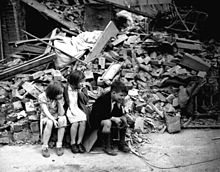Wikijunior:World War II/The Blitz

The Blitz is the name given to the bombing of Britain by Germany. The Blitz started on 7 September 1940 with the bombing of London, which went on for 57 nights in a row. By the time The Blitz ended in May 1941 more than 43,000 people had been killed. In London more than one million homes had been damaged or completely destroyed. Fortunately, some famous buildings like St Paul's Cathedral and even Buckingham Palace were not destroyed so they remained as symbols of Britain's ability to continue fighting.
Hitler thought that bombing Britain's cities would make Britain give up fighting. It didn't come close to working. The bombing brought people closer together.
Ordinary People Helped Out
editThe ordinary people of London worked hard to protect their city. Those who couldn't join the army because they were ill or too old could still help. Some joined the Home Guard, others joined the Air Raid Precautions or Auxiliary Fire Service or many of the other groups that were organised. Even Boy Scouts had a role, showing fire engines where the worst fires were.
Evacuation
editChildren, old people and the ill were evacuated from London to safer parts of the country. In the end nearly a quarter of London's people had left. But nobody was forced to leave and, despite the terrible bombing, many chose to stay.
Air Raid Shelters
editFor those who stayed in London, they needed to keep safe during air raids. Some people had special air raid shelters - a hole in the ground with a roof - to provide some protection from bombs. Many others sheltered in Tube stations.